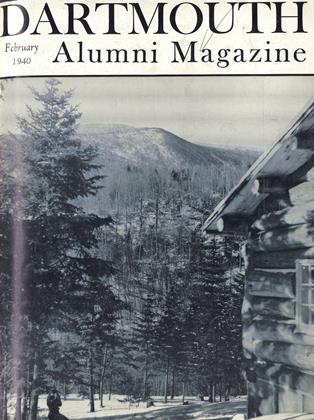THE GRADUATE CLUB, as noted in the first of these two articles, has had its ups and downs. Much like any fraternity, it has had its periods of depression and struggle and its periods of popularity and prosperity. Though the causes of these cycles are difficult of analysis, they seem to have occurred with some regularity; and today the Club seems to be steaming on the general tide of better times. Since its removal in
1937 from the erstwhile President's house on College Street to the Old Beta House back of South Mass, membership has increased, activity developed and interest accelerated. The old house was comfortable, but that was all. Architecturally it was a hybrid in a New England setting, somewhat forbidding, and too far off the beaten path. Its new locale, while no rose, is comfortable, attractively furnished and thoroughly accessible. The Club is no longer a near-bankrupt manse for half a dozen bachelor professors (resident members) to rattle around in.
A good forty members make an almost daily pilgrimage to the Club these days for their mid-morning or late afternoon coffee; another dozen are billiard players and a few are sharks. Probably eight or ten are congenital bridge players, and another ten have the same malady in less virulent form. There are also those who come to read and enjoy a pipe or conversation and a few who find pleasure in "just settin'." Unquestionably the Club is a haven of seclusion and peace for those who occasionally find themselves beset with domestic problems.
The bridge players largely control the back room and often overflow into the rightful realms of cribbage. You can drop in most any Saturday afternoon and find them hard at it, with a couple of cut-in games in full swing. Players shuttle back and forth from one table to the other, with individual scores maintained on a master sheet which is usually maintained by a bizarre system of accounting known only to Dean E. Gordon Bill. Post-mortem arguments are in order though they may easily be settled by referring disputes to Professor J. P. (Big Jim) Richardson, who is regarded as Hanover's almost pontifical authority on contract. Others whose suppers occasionally get cold while a protracted rubber is finished are: Harold Washburn (French), Mike Choukas (Sociology), Bill Geiger (Education), Fletcher Low (Chemistry), Mart Lindahl (Economics), Ford Marden '33 (Chevrolet Czar) and Craven Laycock.
In the privacy of the basement are gathered the billiard players: Charles Proctor in number one position, Paul Sample (Artist in Residence), Charley Sargent (Accounting), Mauritz Hedlund (Buildings and Grounds), Ralph Burns (Education) and Ralph Holben (Sociology).
Probably there is more zest and jocularity among the cribbage addicts than in any other of these indoor sports. Meeting every couple of weeks for an evening of four-handed—with refreshments and a turkey or other suitable prize provided—there is an intensity - of competition between teams not unlike a tug-of-war on a firemen's outing. Leading lights in cribbage are: John Boardman (Medical), Bob Conant (Registrar), Harry Hillman (Track), Frank Garran (Engineering), Tommy Dent (Soccer), Ellie Noyes (Track).
Professor A. Howard Meneely, Dean Neidlinger and Professor Andrew G. Truxal have been presidents of the Grad- uate Club during the past three years, in that order. Under their leadership the or- ganization has expanded, wider participa- tion in club events has been noticeable, and the Club has prospered. Alumni of the College in distant cities have become non-resident members, a privilege to which all alumni are eligible. Because of the ex- istence of the Club as a convenient and congenial center for Hanover visitations this list is growing.
 View Full Issue
View Full Issue
More From This Issue
-
 Article
ArticleMore Than Professor
February 1940 By JOHN HURD JR. '21 -
 Article
ArticleThe College In The Sixties
February 1940 -
 Class Notes
Class Notes1915*
February 1940 By CHARLES R. TAPLIN -
 Article
ArticleEducation Without Books
February 1940 By Davis Jackson '36 -
 Sports
SportsBig Green Teams
February 1940 By Whitey Fuller '37 -
 Article
ArticleHanover Browsing
February 1940 By HERBERT F. WEST '22
Davis Jackson '36
-
 Letters to the Editor
Letters to the EditorLetters
June 1942 -
 Article
ArticleHanover Personal
November 1938 By Davis Jackson '36 -
 Article
ArticleHanover Personal
January 1939 By Davis Jackson '36 -
 Article
ArticleEducation Without Books
February 1940 By Davis Jackson '36 -
 Article
ArticleKIDS ON SKIS: STUDY IN HAPPINESS
March 1940 By Davis Jackson '36 -
 Class Notes
Class NotesDartmouth in T. V. A
October 1936 By Davis Jackson '36, William P. Kimball '28
Article
-
 Article
ArticleFall Track Meet
November, 1910 -
 Article
ArticleWinged Explorer
March 1942 -
 Article
ArticleStaff Apointments
October 1951 -
 Article
ArticleReport: Boom Benefits African-American Men
NOVEMBER 1999 By Davida Dinerman '86 -
 Article
ArticleCaring about Health on the Reservation
SEPTEMBER 1987 By Lynmar Brock '55 -
 Article
ArticleJohn Poor (Addenda)
May 1935 By The Editors

